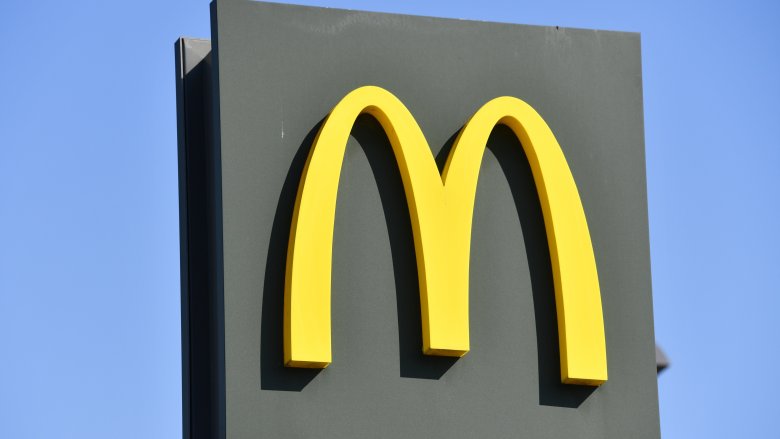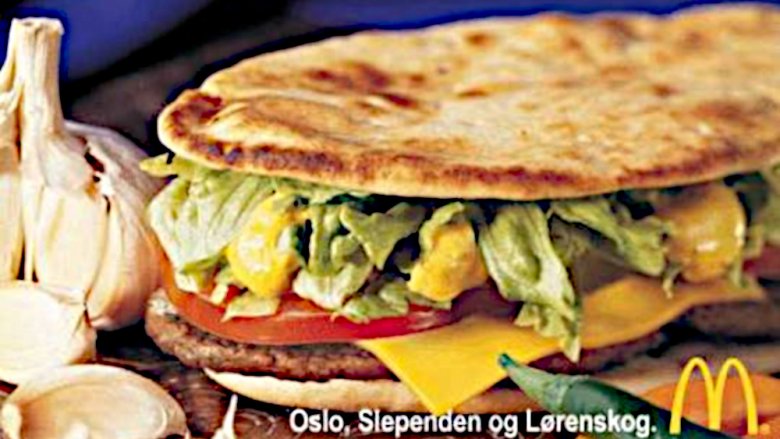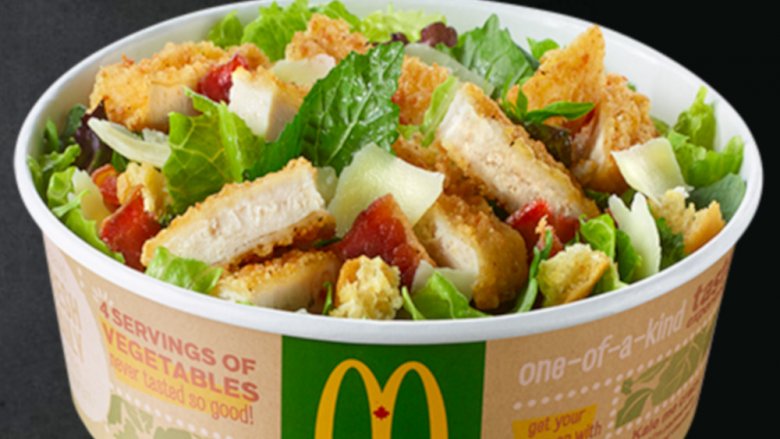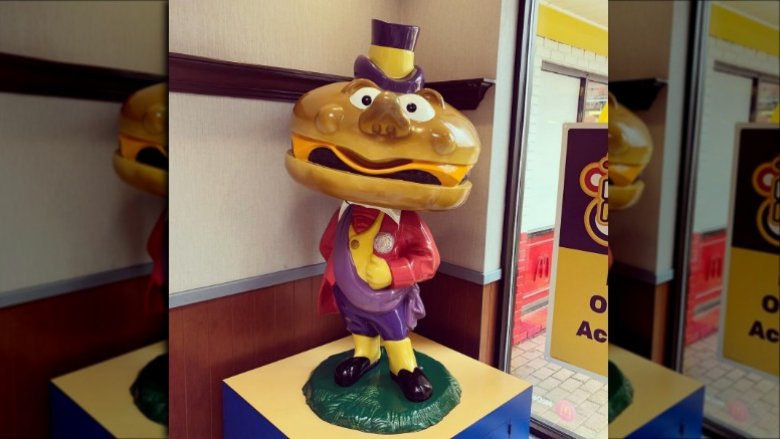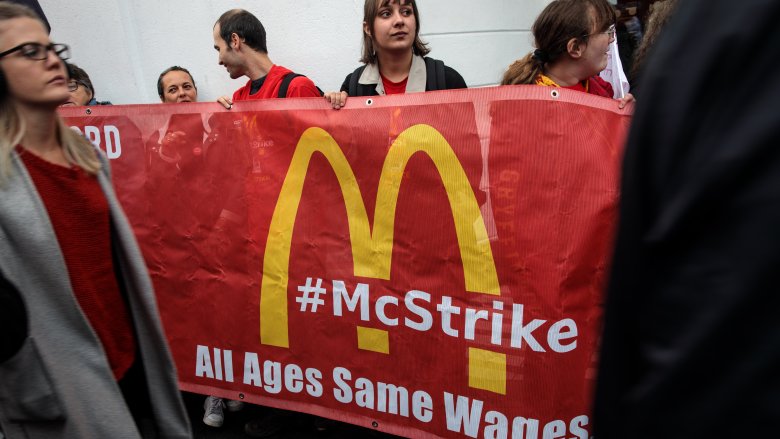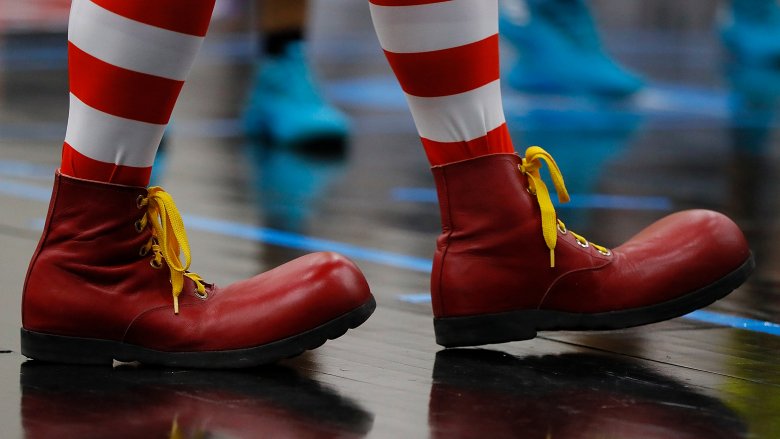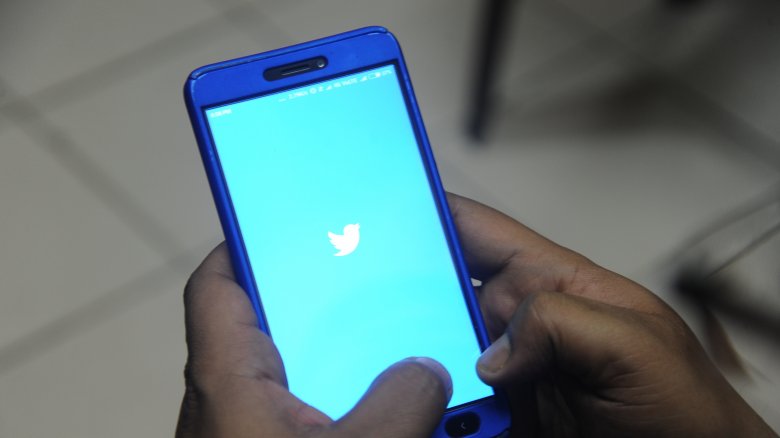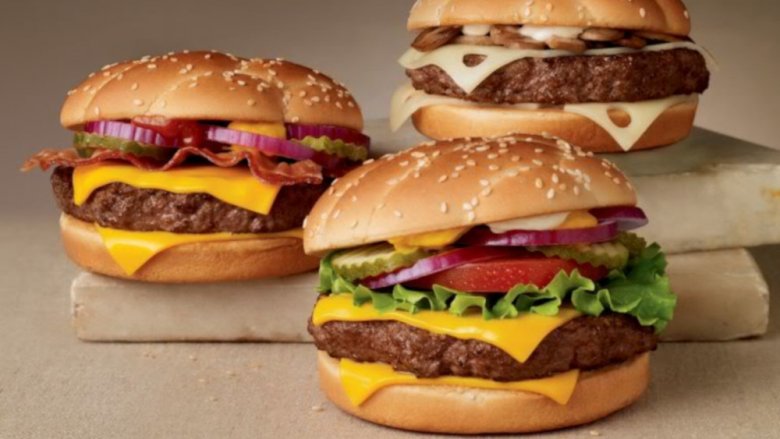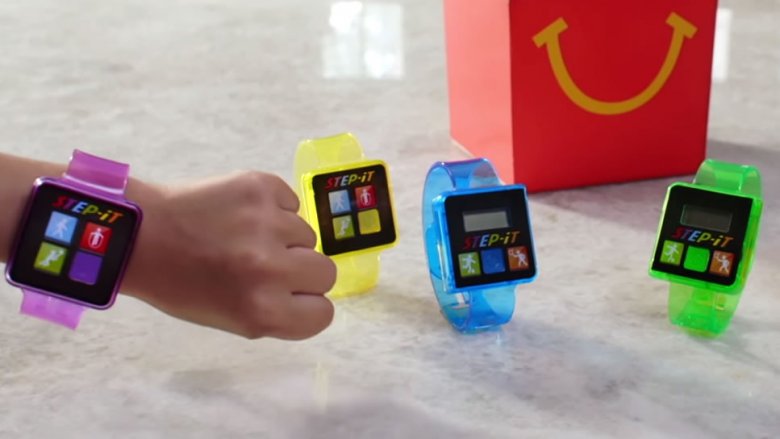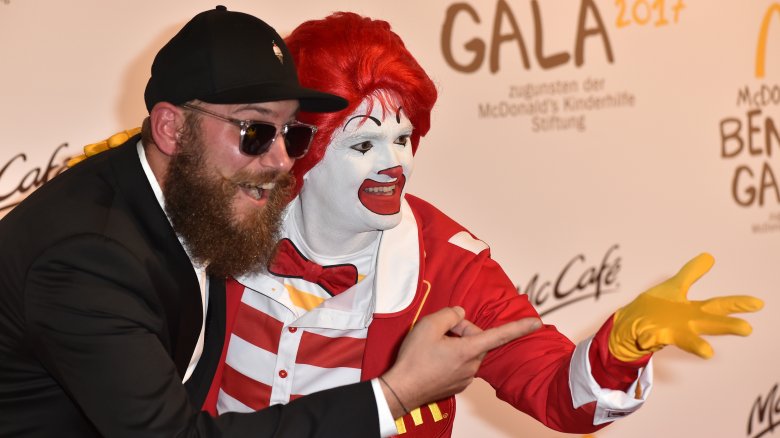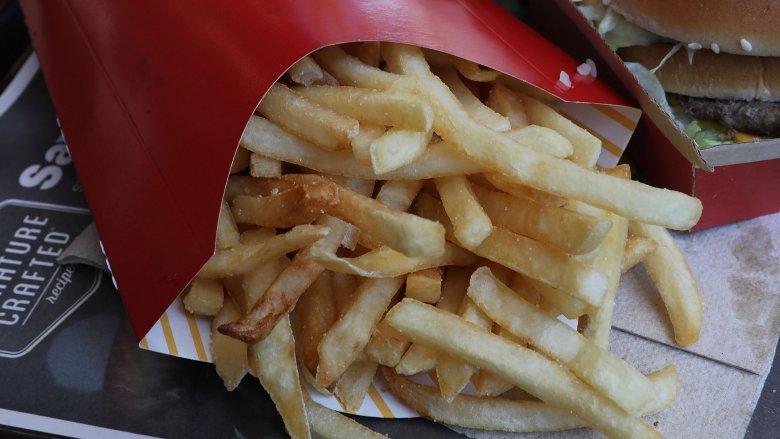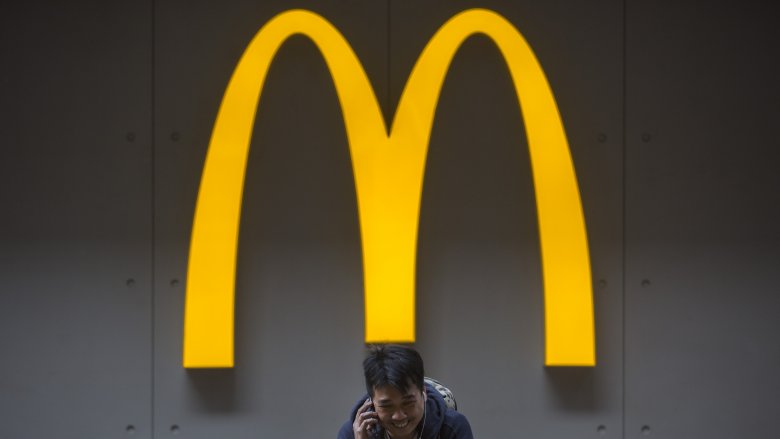The Dumbest Things McDonalds Has Ever Done
For more than 50 years, McDonald's has kept a grip on the popular imagination. From Ronald McDonald to "I'm Lovin' It," the chain has been a ubiquitous social presence since it first began expanding in the 1950s. It now serves millions out of the 36,000 restaurants it's built across the world and is so deeply ingrained in childhoods it's the top distributor of toys on the planet.
But no company rises to those heights without making mistakes, and the company has racked up a number of PR black eyes over the years. Whether it's learning the hard way they're the Goliath in the David and Goliath matchup, falling afoul of the hip-hop scene, stealing from about the last magazine McDonald's should even go near, or throwing hundreds of millions of dollars at a sandwich nobody wanted, here are the dumbest things to ever come out of the Golden Arches.
The McAfrika arrived a the worst possible time
Only sold in Norway, the McAfrika was a limited-edition burger that likely would have gone unnoticed any other year. It was basically a burger on pita, although why that made it taste like Africa is something the chain never laid out. What made the McAfrika stand out, unfortunately, was that as it was hitting the restaurants across one of the richest nations in the world, famines were unfolding in several African countries.
With millions of people facing starvation, Norwegians found being sold a burger named after a continent desperately in need of food relief tasteless and aid groups such as the Norwegian Red Cross and CARE Norway quickly pointed that out to the press. McDonald's even admitted that it was an "unfortunate time" to launch the McAfrika. But despite that, they didn't pull it. Because after all, in the face of an enormous PR disaster reported across the world, what could a food company possibly do to help with a famine?
They made a kale salad unhealthy
Part of any changing menu is embracing food trends, and the developed world has been trying to eat better over the last two decades. For the Golden Arches, that's largely meant declining revenues as people look for healthier options. While that's not going to kill off the House that Mac Built any time soon, it is an indicator they're losing customers. So, in 2015, they performed an about-face on kale, and introduced a kale breakfast bowl.
That lead to a kale salad, but nobody really explained the concept to them, and they added a high-fat dressing and fried chicken. Nutritionists pointed out that a Double Big Mac had fewer calories, less fat, and more protein than the "Keep Calm, Caesar On" salad the chain came up with, making the massive sandwich the healthy (well, "healthier") option. They had a lighter version of the kale salad, but even that boasted similar calorie, salt, and fat content as a Double Cheeseburger. After that embarrassment, though, they at least cleaned up their act: Despite the name, the Bacon Ranch Grilled Chicken Salad is only 320 calories —but of course, that's before the dressing.
Mayor McCheese lost in court
Kids who grew up in the '80s will fondly remember Ronald McDonald's many buddies; the Hamburglar, Birdie, Thanos, er, Grimace. But there's one that's notably missing today: Mayor McCheese. And that's because like many politicians, he had a dark past that got him fired.
In this case, though, it was a copyright lawsuit that forced him out. An ad agency, Needham, Harper & Steers, asked kid's show impresarios Sid and Marty Krofft to use their H.R. Pufnstuf characters to sell burgers to kids, but later told the Kroffts the campaign had been cancelled. Imagine their surprise when the agency hired a crew of former employees from the show and, the Kroffts argued, completely ripped them off by creating McDonaldland, which was a little too similar to the characters and setting of H.R. Pufnstuf.
Indeed, even just looking at the two concepts side-by-side is somewhat damning. The US Court of Appeals ultimately ruled in favor of the Kroffts, ending the Mayor's tenure and firing Officer Big Mac (along with several other McDonaldland characters that were too similar), which is probably why the Hamburglar is still at large. But at least the mayor enjoyed a post-politics acting career.
McDonald's accidentally proved its employees were underpaid
McDonald's is so notorious for paying minimum wage that Merriam Webster defines "McJob" as "a low-paying job that requires little skill and offers little opportunity for advancement." Nearly three decades after that word was coined, McDonald's accidentally underscored just how true that was.
In 2013, the company worked with Visa to create a "finance guide" for employees about how to live on minimum wage in America — and it looked bad for them on so many counts. First of all, it assumed that each McDonald's employee had a second job away from McDonald's. Secondly, it assumed everybody working at McDonald's worked 40 hours a week, which usually wasn't the case.
The site also assumed you could make rent and still have plenty left over by working 80 hours a week at minimum wage, which the National Low Income Housing Coalition reported was pretty much impossible no matter where you lived. It determined a monthly car payment was $150 when the national average was more than twice that, oh, and also, there was no line item for gas. By trying to help their employees stretch a buck, they instead proved that's literally impossible to make a living when you're working at McDonald's. Oops.
They fought Ronald McDonald and lost
In 1956, the McDonald family opened McDonald's Family Restaurant in Fairbury, Illinois, barely a year after Ray Kroc realized he could turn a hamburger stand into a national fixture. While McDonald's began to grow and take over highway exits, the McDonald's Family Restaurant continued to serve the Fairbury community, as son Ron and his wife Sue took over from his parents. Yes, he was named Ronald McDonald. Anyway, the two had nothing to do with one another, until McDonald's decided to open a franchise up the road and demanded the town fixture change its name to "McDonald."
Which, ultimately, they did, if for no other reason than even Ronald McDonald can't fight the Golden Arches. But the McDonald family won in the end: The town's residents voted with their feet, choosing Ron and Sue, and ultimately shutting down the McDonald's franchise in Fairbury. After it moved out, McDonald went back to the name McDonald's, and Mickey D's has left them alone ever since.
#McDStories went terribly wrong
Back in 2012, nothing was hotter than social media and Twitter was rapidly taking over. McDonald's wanted to get in on the Twitter hype, so it sponsored a hashtag, #McDStories. The idea was that people would share all the lovely stories they had of eating fries with friends. What could possibly go wrong by giving complete strangers total access to your branding initiative?
To the surprise of almost no one outside of the Golden Arches, it spiraled out into a years-long PR nightmare, as people related cold-hearted employee behavior, mean-spirited spoof T-shirts, protests against its minimum wage policies, and of course plenty of gross, if completely unverifiable, claims that would make a health department inspector barf. The Golden Arches pulled the campaign just hours after its release, but its holding power was mystifying. It's become a case study in social media mismanagement and even made more popular a term for when a Twitter campaign goes wrong: Bashtag. The only upside, to the extent there is one, is that at least other brands were dealt similar hands that year.
They spent $200 million on the Arch Deluxe ad campaign
No company churns out nothing but hit products, and McDonald's has had its share of bombs. But few of them tanked as hard as the Arch Deluxe.
In the '90s, McDonald's was worried that it was seen entirely as a restaurant for kids and families, and all the cool edgy Gen Xers were going elsewhere. But this was, in McDonald's view, nothing that $200 million worth of marketing couldn't solve.They designed a "Deluxe" line of sandwiches made to appeal to adults, anchored by the Arch Deluxe, and went all out with their advertising for their new, sophisticated burger.
It was the most expensive fast food ad campaign ever at the time... and it flopped. Apparently, those sophisticated adults with super fancy taste buds weren't heading to McDonald's for their gourmet lunches, and the customers they did have weren't impressed by the ultra-expensive ad campaign. Sales for the Arch Deluxe fell way below the chain's projected $1 billion, and it was eventually discontinued.
A fitness tracker Happy Meal toy goes repeatedly wrong
McDonald's has taken a lot of heat over the years for the Happy Meal. Critics argue it's little more than using a toy and marketing to get kids to eat unhealthy food. The company has tried to respond over the years with healthy options like milk and apple slices instead of soda and fries, and to encourage better habits. One attempt to make a healthier Happy Meal, though, went over the cliff and snowballed into a near-perfect PR disaster.
When McDonald's announced it was going to include Step-It fitness trackers with Happy Meal toys, the reaction was universally skeptical. Unsurprisingly for a $3.99 toy, it wasn't particularly good at its job, although the same is often true of fitness trackers in general, so perhaps they could have gotten past that. The crushing humiliation kicked in when reports arrived that the cheaply made devices were causing skin irritation in children. McDonald's quickly recalled the toys and mostly hoped we remembered the apple slices.
The hip-hop community rejected McDonald's gold
Hip-hop has a long and complicated history when it comes to consumerism and product placement. It's an ongoing and sometimes fraught discussion about the tensions between personal success and serving as a role model for a broader community. It's an issue to be handled with tact and sensitivity. McDonald's and ad firm Maven Strategies instead went the exact opposite way.
In 2005, the fast food chain announced it was going to pay rappers up to $5 every time a verse mentioning a Big Mac was played on the air. This was potentially a costly stunt, but it wasn't completely out of left field. Radio at the time, and today, still works on the idea that people only listen to the radio when they hear a massive hit, meaning that if you get into the Top 40, you'll be played constantly across the nation for weeks.
Yet, despite claiming major musicians were lining up to sing the praises of the Big Mac, six months later, they quietly admitted their offer had been met with deafening silence. Although, hey, at least Kanye mentioned fries in "Gold Digger!"
They keep getting sued over their fries
McDonalds fries might be their most popular product in stores, but it's also popular as a topic of lawsuits. In 2001, they were the target of a class action lawsuit over their fry suppliers using a small amount of beef flavoring in their preparation, contradicting the claim that their fries were made with 100 percent vegetable oil. Turns out, they were fried in vegetable oil at the store, but beef flavoring, labeled as "natural flavoring," was added in production. The suit was filed on behalf of Hindu customers, for many of whom the cow is a sacred symbol of their belief, and all other vegetarians who had been misled about the fries.
That would end up costing them $10 million, and you'd think they'd ask their suppliers to retool the recipe. In 2006, they got sued again, this time by people with wheat and lactose issues, over that same "natural flavoring." Aside from beef flavoring, it also contains wheat bran and a dairy product. That lawsuit, though, was partially dismissed and couldn't get class action status, so perhaps they can finally just serve them in peace.
McDonald's sues protesters for libel, and the protesters humiliate them for years
In 1986, McDonald's decided to sue a small environmental group calling itself London Greenpeace (not related to the much larger Greenpeace) for turning out a leaflet accusing the company of dozens of crimes against humanity. It set off a case that went on for decades and ended with McDonald's thoroughly humiliated.
The problem was that UK libel laws put the burden of proof on the publisher, requiring the defendant in the suit to prove each claim. So London Greenpeace, representing themselves in court, tried to do just that in front of the entire world, making studies, evidence, and testimony against McDonald's available to the courts — and the public. Its environmental practices, its worker treatment, its food preparation practices, it all got aired out extremely, extremely thoroughly.
London Greenpeace didn't prove everything to the court's satisfaction, and the judge did rule that some the accusations were libelous. That means McDonald's technically won the case... but did they really? Not only did their accusers get a very large stage to air out some the Golden Arches' dirty laundry, but they ended up looking like nothing more than a bully. When a major corporation takes such extreme measures against a small group of broke activists, it's hard to come out looking good.
